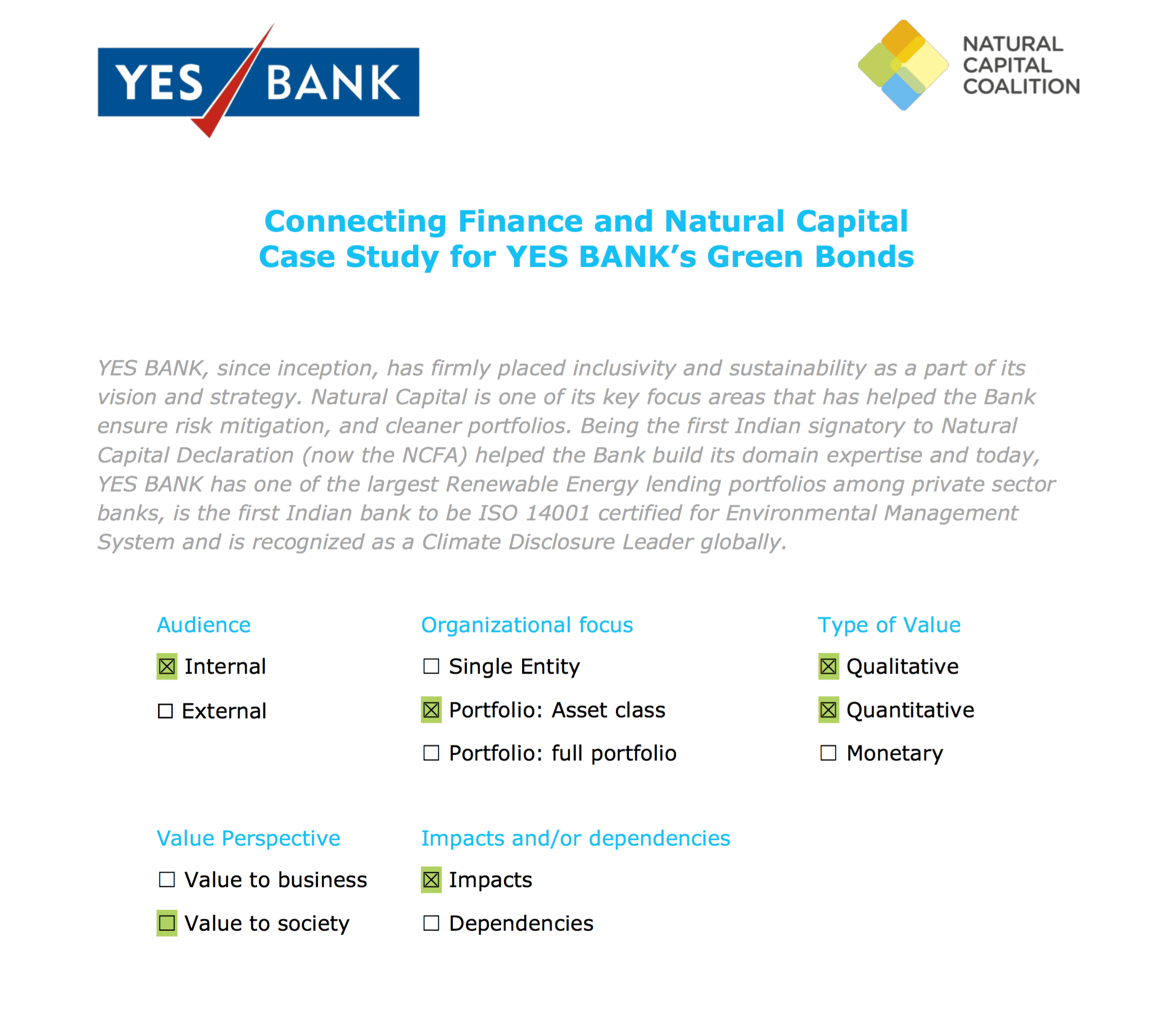Namita Vikas, Group President & Global Head – Climate Strategy and Responsible Banking, YES BANK said; “Our participation in the development of Finance Sector Supplement to the Natural Capital Protocol has allowed us to apply this methodology to YES Bank assured green bonds, and to measure the impacts and dependencies of the projects which these bonds have financed. This process has allowed us to improve existing risk mitigation measures and to assess the impacts we are having through the lending of these assets. I would urge other financial institutions to use the Natural Capital Coalition’s Protocol, sector guides and Supplements. They have helped us to assess risks, highlight opportunities and build on our overall organizational strategy.”
The financial institution in brief:
YES BANK, India’s fourth largest private sector Bank with a pan India presence across all 29 states and 7 Union Territories of India, has its headquarters in Mumbai. Responsible Banking is a key differentiator of YES BANK and is one of the six strategic pillars of the Bank along with Trust, Transparency, Knowledge, Technology and Human Capital. The vision of Responsible Banking is for YES BANK to be the benchmark financial institution for inclusivity and sustainability, and its goal is to positively impact and contribute towards the overall sustainable development mandate while simultaneously ensuring sustainable business growth for the Bank.
YES BANK had previously applied the Natural Capital Protocol to an archetypal beverage company to study the impact and dependencies of the beverage sector and arrive at the real value of water, a key material issue for the sector. Therefore, the team has knowledge of conducting the assessment on its own products and portfolio.
Why use natural capital thinking?
YES BANK took a commitment of mobilizing USD 1 billion towards climate action and financing 5 GW of renewable energy till 2020 on the eve of COP 21, in order to support India’s ambitious renewable energy targets of 175 GW renewable energy capacities. The Bank identified green bonds as one of the key financing instruments to channel finances for India’s green growth. YES BANK has issued three green bonds so far amounting to approximately USD 260 million (INR 1645 Crores).
The Bank decided to apply the Natural Capital Protocol on its green bonds to study their alignment to natural capital concerns and measure the impact and dependencies of the projects funded by these bonds. The Protocol was also used to understand the risks and opportunities arising from their use and investment of the proceeds.
What was the approach?
The Bank has applied the Protocol to all its green bonds, one of the many financial instruments used by the bank. The details of the three issuances are:
February 2015: YES BANK issued India’s first-ever Green Infrastructure Bonds amounting to USD 160 million (INR 10 billion) for a tenor of 10 years.
August 2015: YES BANK raised USD 50 million (INR 3.15 billion) through the issue of Green Infrastructure Bonds to International Finance Corporation on a private placement basis for a tenor of 10 years.
September 2016: YES BANK raised USD 50 million (INR 3.30 billion), through an issue of a 7-year Green Infrastructure Bonds to FMO, the Dutch Development Bank, on a private placement basis.
The proceeds raised through the issue of these bonds/debentures are primarily used in renewable and clean energy projects including generation from sources such as wind and solar projects.
The objective of the assessment was to assess whether all natural capital impacts and dependencies are accounted for the projects funded by green bonds proceeds whilst checking the efficacies of existing strategies used to manage them and have better stakeholder engagement.
As a financial instrument, green bonds would not have their own impacts and dependencies. However, the projects funded by the proceeds of these green bonds transcend their risks, impacts and dependencies to the Bank’s financial instrument. Therefore, for this exercise, the Bank has studied the environmental data obtained from projects during their credit appraisal process and the Bank’s Environment and Social Policy which governs its lending decisions. A review of relevant generally available environmental literature has also been done to arrive at the value for emissions avoided through these projects.
A qualitative valuation technique was applied to identify all potential natural capital related risks and opportunities of these projects. A list of all possible impacts and dependencies was prepared using various sources, such as IFC guidelines, Equator Principles, YES BANK’s E&S policy along with inputs from its risk management team. Post identification, the due diligence documents were validated to check the efficiency of the appropriate measures in place, put to mitigate each risk.
What were the outcomes of the assessment?
During the study on the projects financed by YES BANK’s green bonds, the positive impacts of these projects on the environment have been estimated. At COP21, India took a commitment of reducing 33-35% emissions by 2030 over the 2005 levels and providing finance to these projects is in line with carbon reduction target of the country. It was established from the study that the annual and lifetime CO2 emissions that these projects would help avoid are 2.3 megatons and 55 megatons, respectively along with 19 kilotons of SO2 emissions annually whereas lifetime anticipated reduction would be 454 kilotons. The annual and lifetime emission of oxides of nitrogen that would possibly be avoided through these projects is 5.7 kilotons and 136.7 kilotons respectively with 204.5 kilotons of fossil fuels usage being avoided each year.
These projects not only have a positive environmental impact but also strengthen India’s energy security. The green projects funded by the proceeds of Green Bonds issued by YES BANK will annually generate around 2.35 million MWh of electricity which is equivalent to the volume of electricity required to light up around 2.32 million households in India, in a year.
However, it is important to understand that though renewable projects being financed through green bonds have a huge positive environmental impact, there may be negative impacts as well which if not managed properly can be disturbing for the environment and society. Some of these identified impacts have been listed below:
- Wind energy: noise, visual impact, impact on bio-diversity, change in land use, habitat loss, rehabilitating locals, etc.
- Solar energy: change in land use, water, habitat loss, rehabilitating locals, etc.
- Construction phase of these projects also carry significant environmental and social impact
The exercise of applying the Natural Capital Protocol (NCP) Financial Sector Supplement (FSS) on Green Bonds have helped the Bank establish that the existing measures put in place are effective enough to mitigate any natural capital risk that may arise from the project’s operation, as well as identify the positive contribution to society through reduced carbon emissions, or through national energy security. The Protocol has also helped the Bank to validate its internal policies and processes in place to benchmark itself with Green Bonds Principles and confirmed its alignment with NCP FSS to a high degree.
Next steps:
In future, YES BANK would like to focus the use of the Protocol on specific areas of operation for granularity and accuracy. The Bank is specifically planning to conduct the assessment on natural capital intensive sectors of its portfolio to better understand the related risks and opportunities, which are otherwise not taken into account, for an informed decision making process.













